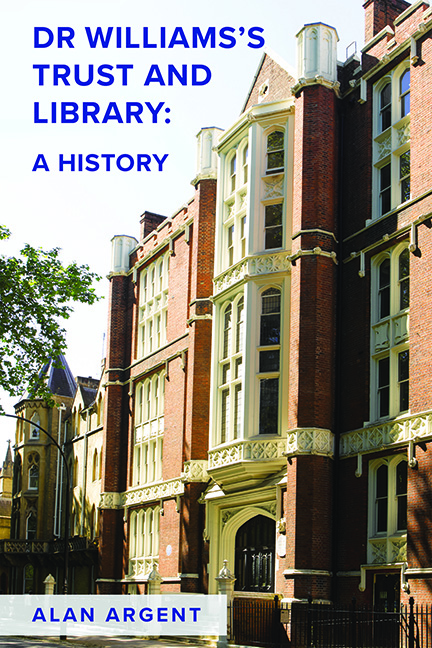Book contents
- Frontmatter
- Dedication
- Contents
- List of Illustrations
- Foreword
- Preface
- Abbreviations
- Notes on Dates, Money, Welsh Place Names and Publications
- Prologue
- 1 Dr Williams and His Will
- 2 Benjamin Sheppard, Receiver 1721–31: Faith, Fitness, and Diligence
- 3 Constructing the Library Building 1725–30: A Proper Plan
- 4 Francis Barkstead, Receiver 1731–47: Piety and Charity
- 5 John Cooper, Receiver 1748–62: Liberty and Liberal Dissent
- 6 Richard Jupp junior, Receiver 1762–95: A Very Respectable Body
- 7 Richard Webb Jupp, Receiver 1795–1850, and David Davison, Receiver 1850–7: Fashionable Sympathies Amid Increasing Light
- 8 Walter D. Jeremy, Receiver 1857–93: The Scrupulous Observer
- 9 Francis H. Jones, Secretary and Librarian 1886–1914: Introducing Order
- 10 Robert Travers Herford, Secretary and Librarian 1914–25: Application and Imagination
- 11 Stephen Kay Jones, Librarian 1925–46, and Joseph Worthington, Secretary 1925–44: A New Age with Old Strains
- 12 Roger Thomas, Secretary 1944–66 and Librarian 1946–66: Trusted Innovator
- 13 Kenneth Twinn, Secretary and Librarian 1966–76: Modest Dependability
- 14 John Creasey, Librarian, and James McClelland, Secretary, 1977–98: Mixed Blessings
- 15 David Wykes, Director 1998–2021: Past, Present, and Future
- 16 Dr Williams’s Trust: An Assessment
- Appendix 1 Trustees in 1723
- Appendix 2 Lists from Short Account (with later additions)
- Bibliography
- Index
8 - Walter D. Jeremy, Receiver 1857–93: The Scrupulous Observer
Published online by Cambridge University Press: 26 May 2022
- Frontmatter
- Dedication
- Contents
- List of Illustrations
- Foreword
- Preface
- Abbreviations
- Notes on Dates, Money, Welsh Place Names and Publications
- Prologue
- 1 Dr Williams and His Will
- 2 Benjamin Sheppard, Receiver 1721–31: Faith, Fitness, and Diligence
- 3 Constructing the Library Building 1725–30: A Proper Plan
- 4 Francis Barkstead, Receiver 1731–47: Piety and Charity
- 5 John Cooper, Receiver 1748–62: Liberty and Liberal Dissent
- 6 Richard Jupp junior, Receiver 1762–95: A Very Respectable Body
- 7 Richard Webb Jupp, Receiver 1795–1850, and David Davison, Receiver 1850–7: Fashionable Sympathies Amid Increasing Light
- 8 Walter D. Jeremy, Receiver 1857–93: The Scrupulous Observer
- 9 Francis H. Jones, Secretary and Librarian 1886–1914: Introducing Order
- 10 Robert Travers Herford, Secretary and Librarian 1914–25: Application and Imagination
- 11 Stephen Kay Jones, Librarian 1925–46, and Joseph Worthington, Secretary 1925–44: A New Age with Old Strains
- 12 Roger Thomas, Secretary 1944–66 and Librarian 1946–66: Trusted Innovator
- 13 Kenneth Twinn, Secretary and Librarian 1966–76: Modest Dependability
- 14 John Creasey, Librarian, and James McClelland, Secretary, 1977–98: Mixed Blessings
- 15 David Wykes, Director 1998–2021: Past, Present, and Future
- 16 Dr Williams’s Trust: An Assessment
- Appendix 1 Trustees in 1723
- Appendix 2 Lists from Short Account (with later additions)
- Bibliography
- Index
Summary
Walter David Jeremy was DWT's receiver for much of the second half of the nineteenth century. His authority was such that he could successfully challenge the trustees’ decisions. Having achieved legal recognition as Unitarians, the trustees had more confidence in their theology, their social importance, and their charity. Crucially, DWL moved home three times, gaining new readers in the process.
Jeremy and His Duties
Jeremy (1825–93) lived on Rosslyn Hill, Hampstead, had chambers at 10 New Square, Lincoln's Inn, and became a DW trustee in 1856. Born in Carmarthenshire, he was the son of Revd John Jeremy of Lampeter and, after attending the Presbyterian College, Carmarthen 1841–5, had held a Dr Williams's scholarship in Glasgow 1845–8, graduating in classics and philosophy. Having ministered at the Unitarian chapel, Northampton, 1851–2, he had studied law, being called to the bar in 1859. He was later an honorary examiner for Dr Williams's scholarships and a member of the Presbyterian Board. He published A History of the Presbyterian Fund and Dr Williams's Trust (London, 1885), which resulted from a series of historical sketches in The Inquirer. Until his death Jeremy's chambers in Lincoln's Inn contained all DWT's current documents.
From New Square he sent out parcels of books, accompanying these with curt, matter-of-fact letters. In June 1862, he told Michael Jones of Bala, ‘You may give the Books to Ministers & Students or others’ but remember ‘that Welsh Books are more useful in the neighbourhood’. In July, William Jones of Amlwch was told that his parcel did not include certain books that he had requested, but that these would be sought out for the next parcel. One tenant in Blackfriars was offered a lease at the ‘yearly rent of £28’, with Jeremy expecting an ‘early answer’. In similar fashion Jeremy reminded DWT's tenants when their rents were due. He asked that they transmit the rent through a banker and inform him when this was done. Suspecting that DWT's tenant at Trevalyn Farm, near Wrexham, intended to leave and strip it of its fixtures, he placed the matter with the solicitor Samuel Cotton, DWT's secretary. In 1862–3 Jeremy acted to prevent Thomas Bridge of Stock, six miles south of Chelmsford, from repeatedly trespassing on trust land ‘in pursuit of game’.
- Type
- Chapter
- Information
- Dr Williams's Trust and Library , pp. 143 - 171Publisher: Boydell & BrewerPrint publication year: 2022

